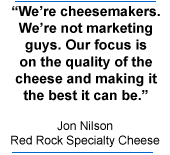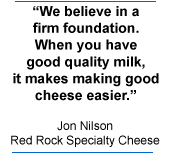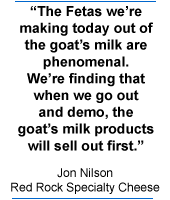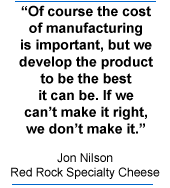 |
|||

|  |

|
|

January 11, 2008 |
|||
| Red Rock Specialty Cheese develops a presence for itself in retail market Company’s goat’s milk cheeses gaining popularity |
|||
By Kate Sander DELTA, Utah — Red Rock Specialty Cheese Co., founded in 2005 by the Nilson family, has experienced a great deal of growth over the past 2 1/2 years. The company started out primarily offering Feta and Ricotta for ingredient and foodservice accounts, but now as the Nilsons and their staff settle in, they are making a coordinated move into the world of retail while still maintaining their other accounts. It’s a singular focus on quality that is making the company successful, says Jon Nilson, president and CEO. “We’re cheesemakers. We’re not marketing guys. Our focus is on the quality of the cheese and making it the best it can be,” Nilson says. Dairy quality has, in fact, always been part of the Nilson family’s focus. The company currently is owned and operated by Jon Nilson and his father, Kay “Doc” Nilson, a former professor at the University of Vermont who also helped start the dairy research center at Cal Poly amidst various consulting projects for some of the nation’s largest cheese companies. At points during his career, Doc Nilson also has owned a dairy lab business and a couple of dairy farms. Meanwhile, son Jon recalls working in the lab as a child and has stayed in the dairy business throughout his career, working for a number of cheese companies until the family decided to purchase a closed cheese plant and start their own cheesemaking business. When they purchased it, the former Cheddar plant was in a state of disrepair. However, the They say their cheese stands out from others because of their focus on quality from milk supply to sanitation to make procedure. “Our products are as unmanipulated as possible. We don’t add preservatives. Our first concerns are flavor profile and functionality; those are paramount,” Jon Nilson says. Market research went into deciding what type of cheeses the company would make, but before they ever purchased the plant the Nilsons knew what they wanted to produce: Feta and Ricotta. The Nilsons wanted to make specialty cheeses for which there was already market demand, and both cheeses fit the bill. Red Rock Specialty Cheese started with making cow’s milk cheese but now also has branched out into goat’s milk Feta as well. The company currently makes about 40,000 pounds of cheese a week, purchasing its cow’s milk from a local cooperative and its goat’s milk from a nearby farm. All of the cheese is made with Grade A, rbST-free milk.
Presently, most of the company’s cheese is branded under the Red Rock name with a small percentage — around 2 percent — sold as private label. Nilson says the company’s sales are extremely diverse, ranging from foodservice distributors to specialty stores. Retail is relatively new; it was only about a year ago that the company began making the transition to retail. For now, most of the retail sales are in California and Utah. The products that are doing particularly well at retail, Nilson says, are the goat’s milk cheese products, which make up 15 to 20 percent of the company’s total production. “The Fetas we’re making today out of the goat’s milk are phenomenal,” he says. “We’re Demoing the goat’s milk Feta certainly helps sales, he notes, because though it is proving popular, selling goat’s milk cheese isn’t without its battles. “It certainly has its challenges because of misperceptions of flavor profile,” he says. But Red Rock’s goat’s milk Feta isn’t “goaty” and people tend to really like it. Nilson notes that not much Feta is needed for a salad but that the goat’s milk cheese packs a greater flavor punch. Thus consumers are willing to pay more for it despite its higher price point than cow’s milk Feta. Nilson says that based on the response he has been receiving for the goat’s milk Feta — even in Utah which tends to be conservative — the market will continue to grow. “The American palate is getting more and more accepting of these types of products,” he says. To continue to meet as well as generate demand, Nilson says he wants to create a significant variety of retail SKUs, specifically on the goat’s milk cheese side. To that end, Red Rock Specialty Cheese already offers a number of cheeses including it’s crumbled cow’s milk Feta in plain, tomato basil, garlic and chive, and Mediterranean marinade varieties; goat’s milk Feta in plain and flavored varieties; cow’s milk and goat’s milk Ricotta; goat’s milk Cheddar; goat’s milk Monterey Jack; and goat’s milk Mozzarella. The company offers the products in a number of sizes, ranging from 4-ounce Feta crumbles to 8-ounce and 1-pound chunks of Cheddar and Jack to larger sizes for foodservice sales. Soon the company also will be offering an 8-ounce cow’s milk curd for retail as well.
“The flavor profile comes through nicely on this cheese; it’s a superior product,” Nilson says. “If we continue to get the reactions we have, we will take it far.” Media coverage has brought additional attention to the company as well, with mentions of the company’s cheese in major California newspapers during the past year. Red Rock Specialty Cheese has room to continue to expand its business, but success is not about the volume of the cheese but rather the quality, the Nilsons believe. “Of course the cost of manufacturing is important, but we develop the product to be the best it can be. If we can’t make it right, we don’t make it,” Nilson says. CMN
|
|||
| CMN article search |
|
|
© 2025 Cheese Market News • Quarne Publishing, LLC • Legal Information • Online Privacy Policy • Terms and Conditions
Cheese Market News • Business/Advertising Office: P.O. Box 628254 • Middleton, WI 53562 • 608/831-6002
Cheese Market News • Editorial Office: 5315 Wall Street, Suite 100 • Madison, WI 53718 • 608/288-9090


 Nilsons took the situation, in stride, focusing on retrofitting it with the best equipment possible while still maintaining traditional make procedures.
Nilsons took the situation, in stride, focusing on retrofitting it with the best equipment possible while still maintaining traditional make procedures. “We believe in a firm foundation,” Nilson says. “When you have good quality milk, it makes making good cheese easier.”
“We believe in a firm foundation,” Nilson says. “When you have good quality milk, it makes making good cheese easier.” finding that when we go out and demo, the goat’s milk products will sell out first.”
finding that when we go out and demo, the goat’s milk products will sell out first.” One of the products Nilson currently is most excited about is a Pasta Filata Goat Mozzarella that just came out of development. The cheese already is available at higher-end pizzerias in the San Francisco area and has been met with favorable reviews. The cheese soon will be available for retail in shred form in 10-ounce cups. The artwork for the packaging currently is being finalized. The company’s label features red rock to highlight the company’s location.
One of the products Nilson currently is most excited about is a Pasta Filata Goat Mozzarella that just came out of development. The cheese already is available at higher-end pizzerias in the San Francisco area and has been met with favorable reviews. The cheese soon will be available for retail in shred form in 10-ounce cups. The artwork for the packaging currently is being finalized. The company’s label features red rock to highlight the company’s location.